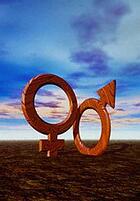
It happens to women a lot. It can also happen to men. You think someone's written a great recommendation for you. So many positive things are said, including: caring, collaborative, compassionate, good with people. But these turn out to be the very qualities that may put you out of the running.
Mikki Hebl's research (supported by the National Science Foundation) is published in the Journal of Applied Psychology. She's found that the words used to describe women are different from the words to describe men. Men are described as leaders, assertive, ambitious, confident, bold etc. And the "male" characteristics are the preferred ones in hiring decisions.
Her research suggests that "gender norm stereotypes—and not necessarily the sex of applicants— can influence hireability ratings of applicants." So men can be victims of these stereotypes too. The research was done on hiring in university environments, particularly in science and engineering. I would guess that this dynamic would be even more true in private industry, particularly in technology and engineering.
Lively comments on the show segment ranged from: "Women should be more like men because 'male' traits lead to business success" to "The prevailing mythology of the white male in our culture is one of dominating other groups and progressively colonizing them (slavery, Native American subjugation)." I'm paraphrasing here.
My comment is: "Studies show that work gets done better if the leader has strong “communal” skills – the Lone Ranger isn’t the successful executive after all, despite the mythology around that and the words used to describe leaders. In fact, in a Harvard Business School article, it was reported that a study found that having a high 'emotional IQ' is a better predictor of CEO success than traditional high IQ."
This is a very loaded topic - one of the commenters said that our ability to be more communal as a species will ultimately determine our very survival.
In practical terms, if you want to get a job, ask your references to describe you in terms of your individual achievement and your qualities as a leader/manager, not in traditional female descriptors. At least until the culture changes!


